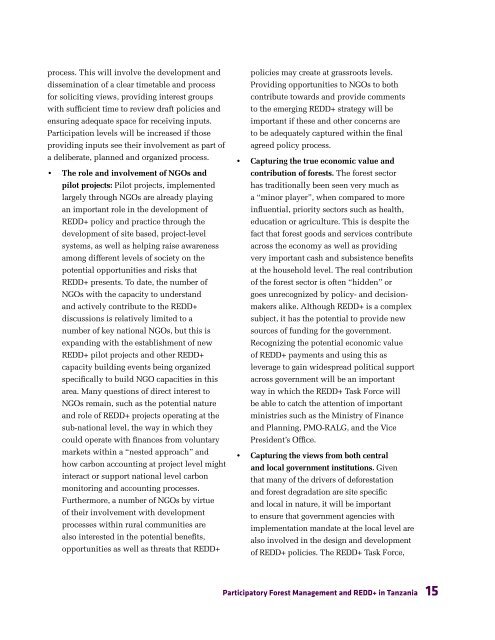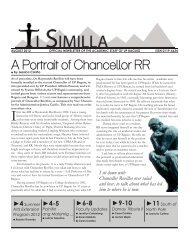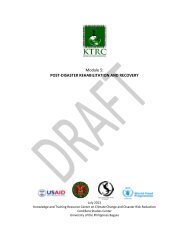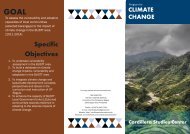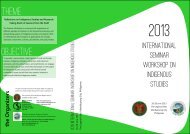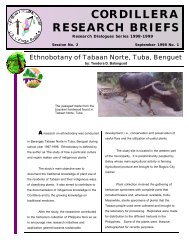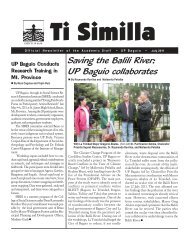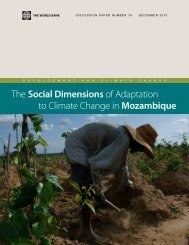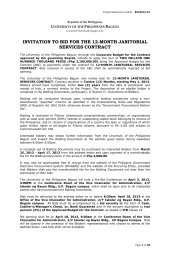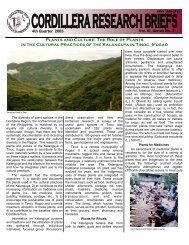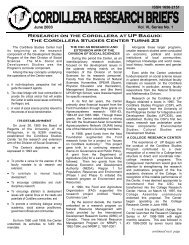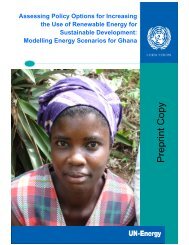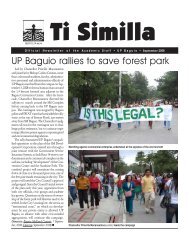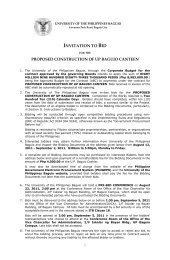Tanzania Report
Tanzania Report
Tanzania Report
You also want an ePaper? Increase the reach of your titles
YUMPU automatically turns print PDFs into web optimized ePapers that Google loves.
process. This will involve the development and<br />
dissemination of a clear timetable and process<br />
for soliciting views, providing interest groups<br />
with sufficient time to review draft policies and<br />
ensuring adequate space for receiving inputs.<br />
Participation levels will be increased if those<br />
providing inputs see their involvement as part of<br />
a deliberate, planned and organized process.<br />
• The role and involvement of NGOs and<br />
pilot projects: Pilot projects, implemented<br />
largely through NGOs are already playing<br />
an important role in the development of<br />
REDD+ policy and practice through the<br />
development of site based, project-level<br />
systems, as well as helping raise awareness<br />
among different levels of society on the<br />
potential opportunities and risks that<br />
REDD+ presents. To date, the number of<br />
NGOs with the capacity to understand<br />
and actively contribute to the REDD+<br />
discussions is relatively limited to a<br />
number of key national NGOs, but this is<br />
expanding with the establishment of new<br />
REDD+ pilot projects and other REDD+<br />
capacity building events being organized<br />
specifically to build NGO capacities in this<br />
area. Many questions of direct interest to<br />
NGOs remain, such as the potential nature<br />
and role of REDD+ projects operating at the<br />
sub-national level, the way in which they<br />
could operate with finances from voluntary<br />
markets within a “nested approach” and<br />
how carbon accounting at project level might<br />
interact or support national level carbon<br />
monitoring and accounting processes.<br />
Furthermore, a number of NGOs by virtue<br />
of their involvement with development<br />
processes within rural communities are<br />
also interested in the potential benefits,<br />
opportunities as well as threats that REDD+<br />
•<br />
•<br />
policies may create at grassroots levels.<br />
Providing opportunities to NGOs to both<br />
contribute towards and provide comments<br />
to the emerging REDD+ strategy will be<br />
important if these and other concerns are<br />
to be adequately captured within the final<br />
agreed policy process.<br />
Capturing the true economic value and<br />
contribution of forests. The forest sector<br />
has traditionally been seen very much as<br />
a “minor player”, when compared to more<br />
influential, priority sectors such as health,<br />
education or agriculture. This is despite the<br />
fact that forest goods and services contribute<br />
across the economy as well as providing<br />
very important cash and subsistence benefits<br />
at the household level. The real contribution<br />
of the forest sector is often “hidden” or<br />
goes unrecognized by policy- and decisionmakers<br />
alike. Although REDD+ is a complex<br />
subject, it has the potential to provide new<br />
sources of funding for the government.<br />
Recognizing the potential economic value<br />
of REDD+ payments and using this as<br />
leverage to gain widespread political support<br />
across government will be an important<br />
way in which the REDD+ Task Force will<br />
be able to catch the attention of important<br />
ministries such as the Ministry of Finance<br />
and Planning, PMO-RALG, and the Vice<br />
President’s Office.<br />
Capturing the views from both central<br />
and local government institutions. Given<br />
that many of the drivers of deforestation<br />
and forest degradation are site specific<br />
and local in nature, it will be important<br />
to ensure that government agencies with<br />
implementation mandate at the local level are<br />
also involved in the design and development<br />
of REDD+ policies. The REDD+ Task Force,<br />
Participatory Forest Management and REDD+ in <strong>Tanzania</strong><br />
15


